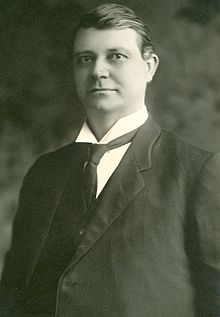Claude Kitchin
Claude Kitchin (born March 24, 1869 in Scotland Neck , Halifax County , North Carolina , † May 31, 1923 in Wilson , North Carolina) was an American politician . Between 1901 and 1923 he represented the state of North Carolina in the US House of Representatives .
Career
Claude Kitchin was a son of William H. Kitchin (1837-1901) and a brother of William Walton Kitchin (1866-1924) and an uncle of Alvin Paul Kitchin (1908-1983), all of whom sat in Congress for the State of North Carolina . He attended public schools in his homeland and graduated from Wake Forest College in 1888 . After a subsequent law degree and his admission to the bar in 1890, he began to work in this profession in Scotland Neck.
Politically, Kitchin was a member of the Democratic Party . In the congressional elections of 1900 he was elected to the US House of Representatives in Washington, DC in the second constituency of North Carolina , where he succeeded Republican George Henry White on March 4, 1901 . After eleven re-elections, he could remain in Congress until his death on May 31, 1923. During this time the First World War fell . Kitchin refused to allow the United States to enter this war. Between 1913 and 1920, the 16th , 17th , 18th and 19th amendments were ratified. Between 1915 and 1919, Claude Kitchin was chairman of the Committee on Ways and Means . In the same period he acted in the successor of Oscar Underwood as the majority leader ( Majority Leader ) of the Democrats in the US House of Representatives. In 1920 he suffered a stroke, of which he died in 1923.
Web links
- Claude Kitchin in the Biographical Directory of the United States Congress (English)
- Claude Kitchin in the database of Find a Grave (English)
| personal data | |
|---|---|
| SURNAME | Kitchin, Claude |
| BRIEF DESCRIPTION | American politician |
| DATE OF BIRTH | March 24, 1869 |
| PLACE OF BIRTH | Scotland Neck , North Carolina |
| DATE OF DEATH | May 31, 1923 |
| Place of death | Wilson , North Carolina |

